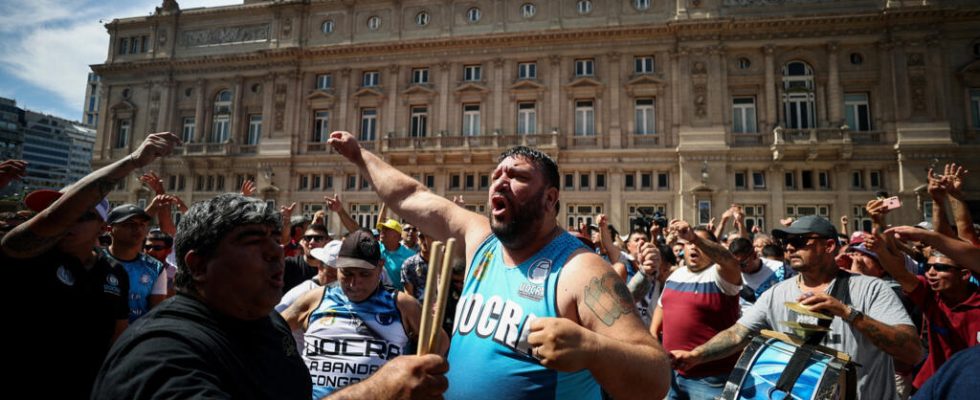Several trade union organizations called on residents to take to the streets on Wednesday December 27 to protest against the decree of the new ultraliberal president Javier Milei, a massive deregulation of the economy which plans to modify or repeal more than 300 standards.
4 mins
The call to demonstrate by the Argentine unions did not move the new president Javier Milei, who took office on December 10: on the eve of the mobilization, he announced this Tuesday the dismissal of thousands of civil servants, and the creation of a new tax. In all, nearly 7,000 positions are affected, and other announcements of civil servant job cuts could follow in the coming weeks.
An unprecedented call to demonstrate
The ultraliberal president announced on December 21 that he had signed a “ decree of necessity and emergency » (DNU) intended to modify or repeal more than 300 standards, including those on rents, privatizations and labor law. Javier Milei plans to reduce public spending by nearly $20 billion. A promise that he repeated during an interview given to an Argentine newspaper on Tuesday, December 26: “ We need a more flexible, more efficient and smaller state. » The unions, outraged by the DNU’s measures, called for demonstrations in front of the courts to submit to justice a request to challenge the decree on the grounds that it is unconstitutional.
Read alsoArgentina: President Milei announces massive deregulation of the economy
“ It is a first for the unions to come in front of the courthouse, in front of the judiciary, commentsto RFI Denis Merklen, sociologist and director of the Institute for Advanced Latin American Studies (IHEAL). In general, in Argentina, traditionally, unions address the executive power. They demonstrate in front of the presidential palace. » Demonstrations which, however, have little chance of succeeding, according to him. “ You should know that the Decree of Necessity and Emergency (DNU) has been used by all previous presidents Javier Milei since the constitutional reform of 1994, including the Kirchner couple who widely used this type of decree to have a law adopted at a time when the Chamber of Deputies in particular or the Senate was not favorable to them. Javier Milei, from this point of view, is not making an innovation, it is not a radical change. It is a situation known in Argentina as it is known in France that 49-3 is used by the government in situations where it wants to move quickly and where it does not benefit from a parliamentary majority.”
A new “ Kicillof tax »
The Argentine Parliament, which has ten days after publication in the Official Journal to approve or reject the decree in its entirety without being able to open discussion on the details of its content, met since Tuesday, December 26 for an extraordinary session. “ It is very likely that we will be surprised […] by legislators who will come and negotiate with the president to approve this or that provision, reacts Denis Merklen. For example, the radical party is now seeking to have the government present not a single decree with 300 measures, but to cut it into pieces, which would allow this party to support the government on certain provisions and to disavow it on others. This would allow these parties to maintain a certain unity and develop a negotiating strategy. »
If it is still too early to know what will happen to the text before Parliament, where the presidential party is in the minority, Javier Milei went further on Tuesday by announcing the creation of a new tax. The country was in fact ordered in September to pay $16 billion in damages to shareholders of the Argentine oil company YPF, nationalized in 2012. We don’t have all this money. So we are going to create a tax: the Kicillof tax », assured the head of state.
A form of political revenge against the current governor of Buenos Aires, who had carried out the nationalization of the company under the presidency of Cristina Kirchner. A name chosen so that “ Argentines are reminded every day of the horror committed by Kicillof and that every day we must pay a certain amount of money to pay for the mistake of a boy whose ideological perspective harmed the 46 million Argentines “, explained the president.
(And with AFP)
